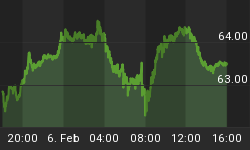
Markets Care About Money Printing
While the Federal Reserve has ended its quantitative easing (QE) program, central banks in Europe and Asia continue to implement ultra-easy monetary policies, which provide a tailwind for foreign stock markets. China announced additional economic stimulus last Sunday and more may be on the way. From The Wall Street Journal:
China's central bank has long been critical of the bond-buying programs adopted by its counterparts in developed countries. Now, it's pondering its own version of such easing and a close look at its balance sheet shows it has room to do just that. Under deliberations at the People's Bank of China is a proposal that could allow commercial banks to swap local-government bailout funds for cash as a way to bolster liquidity and boost lending, according to people familiar with the talks.
Have Markets Responded?
For a weak market to become a strong market a transition must take place from a downtrend to an uptrend. The three steps needed for a trend reversal are outlined in Trends: As Easy As 1-2-3. Germany (EWG) completed step 3 earlier in 2015 by making a higher high.

A similar and important higher high was made by the EAFE Index (EFA) last month.

Land Of The Rising Sun
Japan (EWJ) recently broke out from a two-year consolidation pattern and simultaneously completed step 3, telling us the probability of good things happening on a sustainable basis are higher today than they were just a few weeks ago.

New Trend Emerging in Emerging Markets?
Emerging markets (EEM) have been laggards for years. Recent developments say the odds of flipping to the outperforming category have improved.

Breakout After Seven Months Of Consolidation
The all-Asia ex-Japan ETF (AAXJ) recently broke out in a bullish manner from a seven month base (period of indecision and consolidation).

Big Pops Speak To Changing Perceptions
Hong Kong failed to clear resistance twice in 2014 (see red arrows below). While some "give back" may be in order in the short-run, the recent breakout is positive from an intermediate-term perspective.

Six-Year Breakout
The Vanguard Pacific Viper (VPL) recently cleared resistance dating back over six years. The longer VPL can remain above the blue line, the better for the bulls.

Investment Implications - The Weight Of The Evidence
All investment decisions involve opportunity costs. We occasionally make a "chess move A" in order to redeploy capital into a better risk-reward opportunity via a "chess move B". For example, we recently took profits in homebuilders and redeployed the cash into emerging markets (VWO). The chart below shows XHB outperforming VWO from October 2014 until late March 2015. Recently, the odds have shifted in favor of VWO relative to XHB. The charts speak to probabilities and they can assist us in the area of risk relative to reward.

Opportunity Costs
We established some small positions in foreign markets on February 20 and noted the observable improvements that were taking place overseas in a February 27 video clip. The chart below shows the S&P 500 (SPY) relative to a global stock ETF (ACWI) as of April 21. Recent developments tells us the odds have been improving for foreign stocks relative to U.S. stocks. Since all breakouts, especially those that have a vertical look, are subject to retests, "give backs", or failures, we prefer to take a diversified approach rather than betting on a single market, such as China.
















